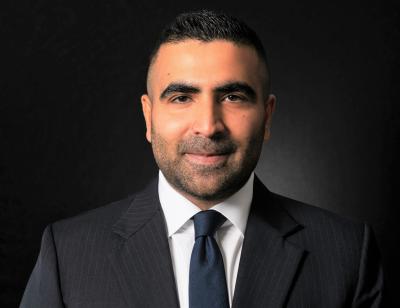Wealth Solutions & Wealth Planning
The Future of Residence and Citizenship — Sovereign States in the Metaverse?

Nirbhay Handa of Henley & Partners
Sep 19, 2022
The convergence of blockchain technology, crypto assets, and virtual reality is swiftly bringing the metaverse to life and changing the way we live, work, and interact. Big tech companies, vanguard brands, international banks, and sovereign states are already invested in the metaverse and driving the transition to an even more digital life.
By: Nirbhay Handa is Group Head of Business Development at Henley & Partners and the Managing Director and Head of the firm’s Global South Asia team
The future: Digitally fluid lifestyles.
The pandemic catalyzed our transformation and adaptation to working remotely, medical appointments over Zoom, and sitting exams at home. The metaverse augments such experiences by enabling a digitally fluid lifestyle, where more of our lives happens in the new virtual ecosystem.
Early metaverse adopters and advocates are technologists, crypto and non-fungible token (NFT) investors, and those captivated by the opportunities that this futuristic, decentralised, digital reality holds. Most are affluent individuals with a macro-perspective who value optionality and seek the unhindered liberty to transact and interact in a market that offers greater flexibility.
Investment migration in the metaverse
In a recent report entitled ‘Metaverse and Money: Decrypting the Future’, Citi’s most conservative forecasts for the metaverse estimate that it will be a USD 8 trillion marketplace by 2030. This opens a wealth of opportunities for every sector, including investment migration.
To date, advisory firms have highlighted the myriad of benefits that residence and citizenship by investment programs grant high-net-worth individuals, including access to additional jurisdictions, top academic institutions, cosmopolitan business hubs, and lucrative property opportunities. Yet, as humanity transitions to a more virtual lifestyle where we can conduct business with like-minded forward-thinkers in the metaverse, attend Harvard online, and invest in digital real estate using crypto, sovereign states too must take the next step.
South Korea, Palau, Barbados among the first movers
South Korea has identified the metaverse’s potential and started investing to create a metaverse-based ‘Seoul’ offering its citizens a digital interface for public services. Barbados has established a diplomatic embassy in Decentraland, a virtual reality platform based on the Ethereum blockchain, and is considering replicating this initiative across other metaverses.
In a bullish move, Palau has presented a unique proposition — digital residency — that has attracted over 300,000 applicants. In late June, Palau announced that identification cards will be issued to digital residents as NFTs on Binance’s BNB Chain blockchain. Notably, by using blockchain and advanced identity verification, Palau can cede residency to a specific individual, exemplifying how gainful blockchain will be in resolving the vexatious matter of compliance and screening for the investment migration industry.
It also raises the gargantuan matter of sovereignty and the possibility of states existing in the metaverse, but at the most rudimentary level, governments now have a window of opportunity to blend, merge, and even replace their current investment migration programs to continue capitalising on the foreign direct investment they generate. Soon, investment migration host countries such as Portugal, whose Golden Residence Permit Program is ranked 1st on the Henley Residence Program Index 2022, Malta, whose Granting of Citizenship for Exceptional Services by Direct Investment Regulations (S.L. 188.05), under the Maltese Citizenship Act Cap. 188, LN437 of 2020, allow for the granting of citizenship by a certificate of naturalisation to foreign individuals and their families who contribute to the country’s economic development, and St. Kitts and Nevis with its citizenship by investment program could all undergo ‘metafacelifts’ or find themselves competing with new sovereign players in the metaverse.
A whole new world of jurisdictional possibilities
Citizenships in the metaverse are bound to democratise the distribution of resources among nation states. Countries with limited resources in the real world now hold the potential to position themselves as attractive jurisdictions in the metaverse. Small nations lacking in natural resources could carve an edge with e-governance policies designed to attract ‘metaresidents’ or ‘metacitizens’. Attractive sovereign states in the metaverse are likely to offer organised legal infrastructures and favourable tax climates that enable their citizens to protect and preserve their wealth sitting in digital assets. These ‘meta nation states’ are also likely to be equipped with sophisticated legacy planning tools allowing their citizens to pass their digital wealth to future generations with ease.
In future, individuals may be physical residents of one country but metacitizens of another because they connect with the values, ideologies, and laws of the meta state more than where they are based in the real world. Our digital identities are becoming more elaborate in tandem with the number of passwords we must remember to maintain our digital presence. It is only a matter of time before our citizenships converge with our digital identities and when that time comes it is likely that our metacitizenships will be used by real-world sovereign states to replace traditional methods of immigration or identity verification, with every citizenship representing an inimitable NFT, holding all critical information about the metacitizen, minimising the current need for onerous documentation. New sovereign meta states may be run like decentralised autonomous organisations, putting power in the hands of people and driving new benchmarks of democracy, eradicating the polarisation of politics that we currently see.
Taxing tomorrow’s marketplace
The quandary that sovereign states are posed with when strategizing their role in the metaverse is how and on what premise they can tax the economic activity that is already taking off in this digital ecosystem. To address practical issues such as whether metaverse real estate transactions attract VAT or capital gains, the OECD is designing a crypto-asset taxation framework that could iron out such matters, paving the way for a new reality.
Sovereign states existing in the metaverse is now closer to being a reality than a dream. Whether a digital residence or citizenship program is offered in conjunction with or in lieu of one in the real world, we are undoubtedly on the brink of a paradigm shift to a more virtual world. The possibilities are endless, and a growing proportion of futuristic investors will seek investment migration solutions that align with their digitally fluid reality and enhance their real world and metaverse optionality. Investors and sovereign states alike should start exploring now.


More from Nirbhay Handa, Henley & Partners
Wealth Solutions & Wealth Planning
The Rise of Global Citizens from Asia: Trends and Developments in Investment Migration
Strategy & Practice Management
Henley & Partners: Working with Asia’s HNWIs and Wealth Managers to Promote Investor Migration
Latest Articles






